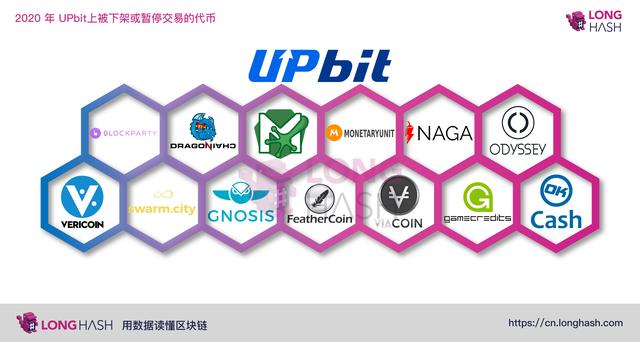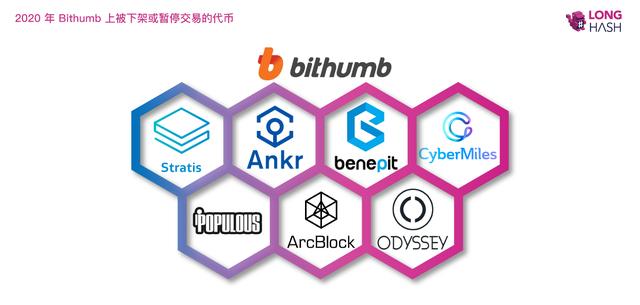Why South Korea's top crypto exchanges delisted cryptocurrencies on a large scale
Source / LongHash

Recently, Bithumb and UPbit, the two largest crypto exchanges in South Korea with the highest trading volume, have taken the decision to suspend multiple cryptocurrencies, suspend trading, or issue investment warnings. What is the reason?
On February 28, UPbit suddenly announced that it would delist 17 cryptocurrencies. The main reason why most crypto assets on UPbit are taken off the shelf is the lack of communication between cryptocurrency developers and exchanges.
- "Year Spring Red Packet Rain"-Barkis Network Public Chain (BKS) Million Red Packets Coming Soon
- Oil price avalanche! Bitcoin plunges $ 800, or will the black swan continue?
- Bitcoin suffers from the "siege of siege", and there are several incidents outside the collapse of the international market that are preventing Bitcoin from return
As a general note to warn of cryptocurrency risks, the UPbit team stated:
"Due to communication difficulties with the project technical team, related technical support may have problems. The small liquidity makes the coin / token vulnerable to price manipulation. Therefore, in order to protect investors, we released an investment caveat."

Due to similar issues, Bithumb also issued a "high-risk cryptocurrency" warning on multiple cryptocurrencies, and issued a statement later.
The company states:
"In accordance with Bithumb's" High-Risk Cryptocurrency Selection Policy ", Bithumb has marked and declared Populous (January 16, 2020) and CyberMiles (January 23, 2020) as high-risk cryptocurrencies. Bithumb is continuing to monitor the trading currency Eligibility, but the reasons why cryptocurrencies are designated as high-risk assets have not been resolved. "

Since the beginning of 2020, both UPbit and Bithumb have made controlling the quality of cryptocurrencies within the exchange a top priority.
Both companies have adopted a strict policy, and if the developers of the vetted cryptocurrency are unable to resolve the concerns of the exchange, the exchange will consider removing the corresponding cryptocurrency.
For example, UPbit uses a process of issuing investment warnings, conducting a week-long review of cryptocurrencies, and then assessing whether developers have made appropriate changes. If UPbit believes that these issues have not been resolved, it will end trading support for the cryptocurrency under review.
"After the investment warning is issued, UPbit will thoroughly review the cryptocurrency for one week to decide whether to remove it. If the reason for the investment warning is not satisfactorily resolved within the above period, Upbit will issue another A separate statement announcing the end of the transaction, "the company said.
Many factors are taken into account when an exchange decides whether to initiate a review process on whether to withdraw a cryptocurrency. So far, UPbit and Bithumb have mentioned the following reasons why cryptocurrencies were taken down:
1. Cryptocurrency developers lack the willingness to communicate with exchanges on solving problems
2. Lack of understanding of Korea's cryptocurrency market
3. Developers are not active enough
4. The trading volume and the overall demand of local investors are too low
5. Problems with market or price manipulation
So what does this mean for the Korean cryptocurrency market? This may be a good move. The implementation of complex and comprehensive quality control by head exchanges may set a precedent in the industry, that is, those cryptocurrencies that do not meet the standards or do not provide sufficient support for exchanges may face the risk of being delisted.
The higher standards adopted by UPbit and Bithumb have created a more accessible environment for investors and exchanges, as they filter out cryptocurrencies with relatively low market demand, transaction volume, and developer activity.
Is this a broader overall trend?
The timing of UPbit and Bithumb's quality monitoring of cryptocurrencies coincided with the G20's call for adoption of the latest Financial Action Working Group (FATF) cryptocurrency guidelines.
The FATF is a financial regulator under the G7 countries, and has requested G7 and G20 member states to strengthen their AML and anti-terrorist financing policies against crypto exchanges. In response to FATF's call for a stricter regulatory framework, exchanges may begin to take active action to create a more secure trading environment for investors.
In 2020, Hong Kong, Switzerland, and Japan have all adopted the FATF guidelines to implement stricter policies on cryptocurrency exchanges and transactions themselves. However, although Japan is very strict with the SGD, the country has not taken the initiative to take down the tokens in the transaction like South Korea.
LongHash , read the blockchain with data.
We will continue to update Blocking; if you have any questions or suggestions, please contact us!
Was this article helpful?
93 out of 132 found this helpful
Related articles
- Platform currency war: the secret behind the value of OKB, HT, etc. |
- Slump ignites panic, BTC will test $ 8,000 intensity
- Viewpoint 丨 Can the value of Bitcoin cover the environmental costs of mining?
- Ethereum Blockchain Application: Are Enterprises Moving from Private Networks to Public Networks?
- Bitcoin plummeted early in the morning, where is the data for the outsole?
- National financial scam? Venezuela's government takes the lead in cutting leek oil coins
- Babbitt column 丨 Why does the blockchain wave trigger a new round of business change?




